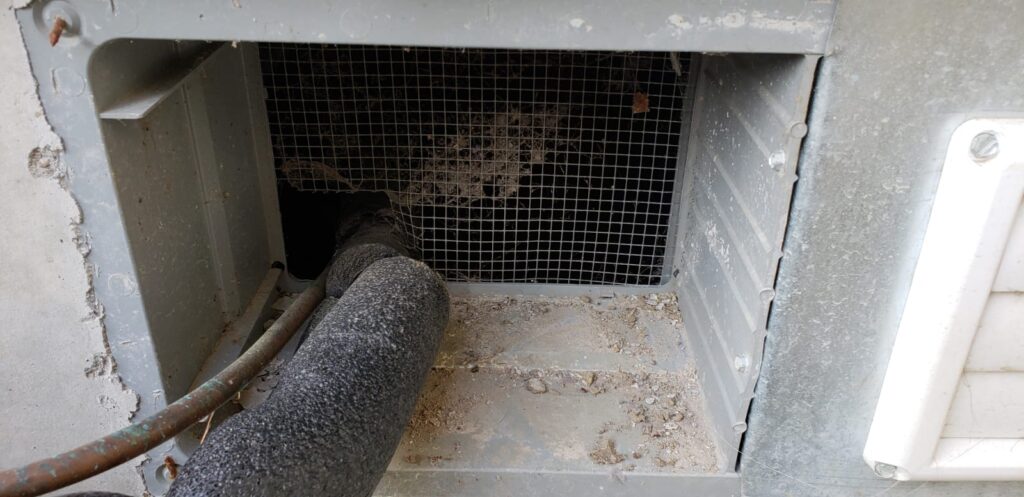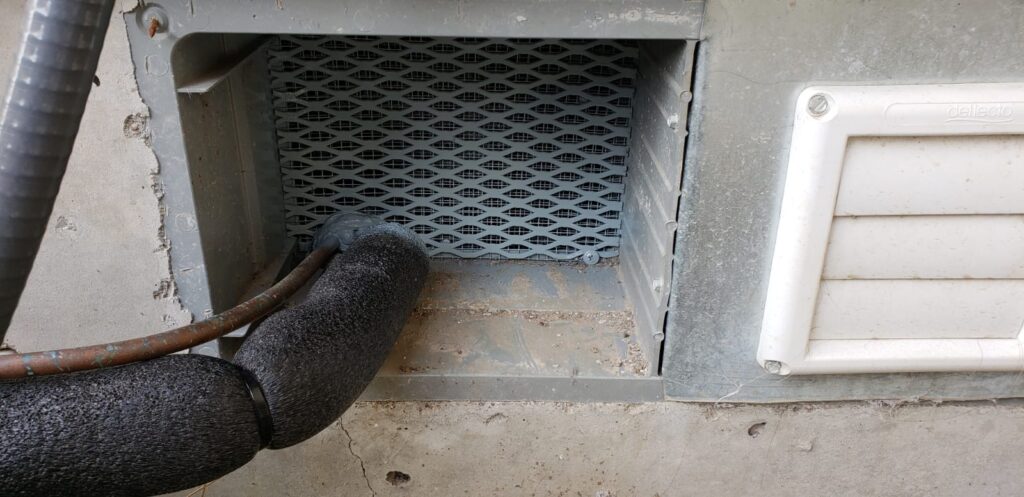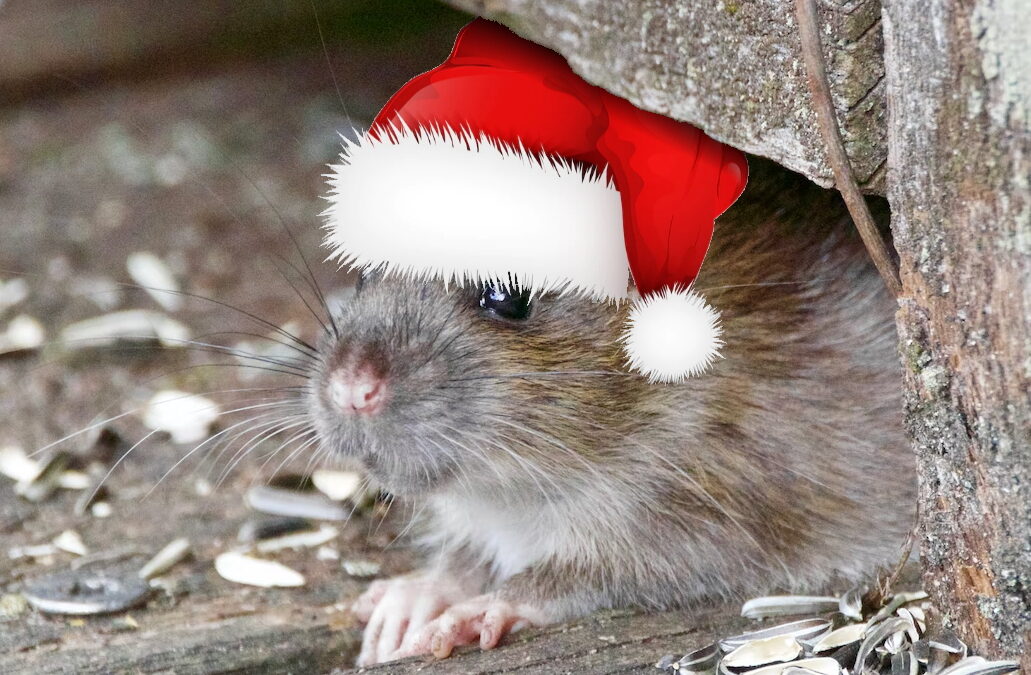Twas the night before Christmas, when all through the house, not a creature was stirring, not a rat…not a mouse.
As we enter the holiday season, the insect division here at Good Earth Pest Company lets out a collective sigh of relief. The cold temperatures of the Willamette Valley put most small crawling pests to sleep for the year, easing the workload from the manic tornado of Carpenter Ants, Wasps, Cockroaches, and stink bugs that is the summer. Time to relax, unwind with the family, eat some turkey, and watch some Oregon State football. Maybe, after that, get those Christmas lights put up. Or, if you’re like me, just plug them in…they’re still up from last year.
This is the season that our Home Services division at Good Earth gets its time to shine.
Now don’t get me wrong, these guys are always killing it (no pun intended). Their summer work includes fun activities like trapping skunks, raccoons, and nutria as well as protecting landscapes from moles and gophers. All this and more on top of doing all the rodent work! Take this into account when I tell you that summer is their “off-season”.
But right now, tis the season of frigid temperatures and miserable rain (and sometimes snow). The season to seek shelter, and that goes for both humans as well as rats and mice. You see, rodents have a tough time with cold weather, and they can actually freeze to death quite easily. They enter homes to take refuge from the winter elements that Oregon brings. And when Mr. Jones sees that rat scurry under a kitchen cabinet while going for his late-night snack, it’s an emergency! That’s why our Home Services Technicians are out there every day, rain or shine, wind or cold, because a lot of people need help with rodents right now.
Here at Good Earth, we do things a little differently than many of our competitors. Rather than just putting out a bunch of rat traps and rodenticides (which all can have their place), we take a more holistic approach and focus on the environmental factors that lead to a rodent infestation. This course of action is called integrated pest management, or IPM and as everybody knows, the first step to any IPM program is a thorough inspection.
Inspection
When your Good Earth Technician arrives on site, they will inspect the home and the environment around it. They are looking at the foundation, doors roof, and crawlspaces for any and all gaps and holes that a rat or mouse could use to gain access to the building. For rats, this is any gap larger than ¼ inch and for mice, it’s even smaller so you can imagine how meticulous and observant our inspectors have to be. They will also evaluate the exterior of the home and advise any alterations like trimming trees and brush, removing storage and other harborage sites as well as eliminating food sources that may attract undesirable wildlife. The Technician will then put all this information together to create a game plan for the next phase of our rodent program and the second step in IPM, exclusion.

A rat entry point in a foundation vent
Exclusion
Exclusion is the mechanical control portion of IPM and is the creation of physical barriers to restrict access to or “exclude” pests (in this case, rats and mice). Basically, we seal all the entry points that were discovered during the inspection. Sometimes it’s a new foundation vent or crawlspace access panel. It could be new weather stripping on a door or a gap in the eves or at a junction in the roof. Or it could be something under the house, like an abandoned pipe or waistline. Each situation has its methods and materials, but the result is a home that is sealed up enough that the mice and rats can’t get in. Once exclusion is performed, the next step in the IPM program is sanitation, and the client must take a more active role in this part of the process.

The vent after repaired by Good Earth Pest Company
Removing Conducive Conditions
Also known as sanitation or cultural control, this is the process of creating an environment around the home that doesn’t invite or allow for the foraging, feeding, or nesting of wildlife therein. That ivy on the fence line, get rid of it. That stack of old pallets? Gone. Compost pile? How about metal, sealed compost bins? Do you like songbirds? Too bad, get rid of those bird feeders, get a pair of binoculars, and go to the park. I jest, but in reality, too many of these factors will make your yard a haven for rodents. Don’t worry, you can still have bird feeders, just get them away from the house if you can. Always best to err on the side of caution.
Trapping and Maintenance service
Now the house is sealed up and resistant to entrance by the various Rodentia. Nothing is getting in so by default nothing is getting out either. To avoid starving pests and unpleasant smells we employ a trapping program to remove the rodents that are still inside. Once we’re confident they’re out (which can take a few weeks) we can begin our maintenance service. A technician will install monitoring stations around the exterior of your home to help monitor and control the outside population. These boxes will be serviced by trained technicians every month or two depending on the level of infestation, and during these services the tech will assess the exterior for any upkeep that the homeowner should know about. It’s a whole lot of work getting rid of those things, and we don’t want you to have to go through it again.
So, if you or somebody you love suspects they are having rodent issues give Good Earth Pest Company a call. Or if you’re not located in Corvallis, Albany, Salem, Eugene, Tigard, Beaverton, or the surrounding areas, then ask around about pest companies that perform exclusion where you live. It’s the way to go when it comes to protecting your home. Oh, and a friendly tip, when you have any professional working on the outside of your house, offer them some coffee or something, it’s cold out there.
Instead of emotional barriers, let’s build physical ones.
~ Adam Hiddleson



